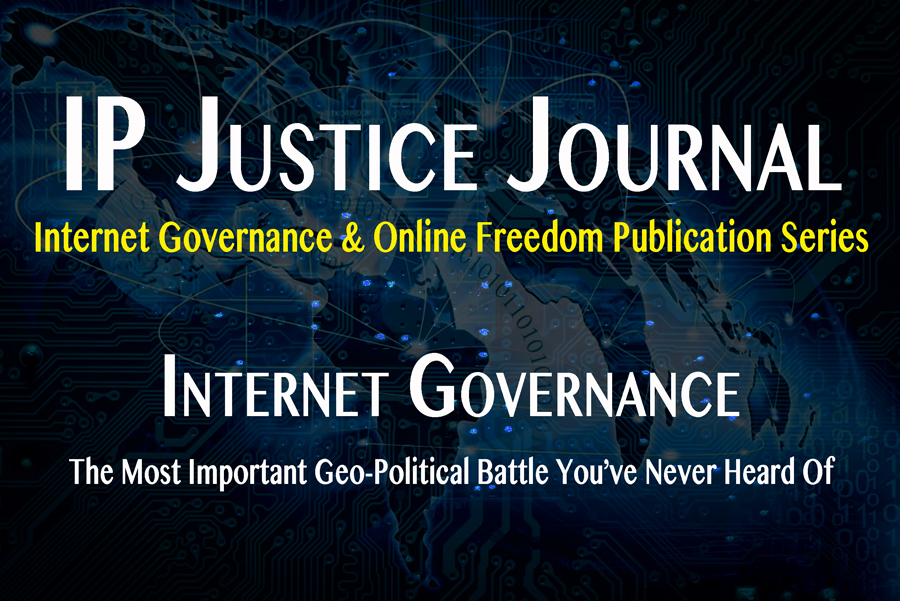
In this series of articles, IP Justice and the collaborating authors explore the role of different stakeholders in Internet governance matters with a view toward protecting Internet freedom.
The Internet governance model known as “multi-stakeholderism” has always been evolving and includes a variety of interpretations and implementations, the most commonly known implementation is ICANN, which manages the Internet’s domain name system. Key features of multi-stakeholderism are that it has operated, to a large extent, based on bottom-up cooperation by those who have a stake in the outcome and by being private-sector-led, in contrast to governance models of the past, which were largely public-sector-led.
However, some governments do not agree with the sharing of power between stakeholders within Internet governance fora such as ICANN, and advocate for the return to public-sector-led governance models for the Internet. Even within ICANN, states have dramatically increased their power in recent years, including heightened requirements that the ICANN Board provide due consideration to governmental “advice” on policy matters. Other stakeholders, including ordinary Internet users reliant on freedom of expression or small businesses dependent on innovation, now struggle with the growing power imbalance as it shifts in favor of nation-states.
All stakeholders are equal. But some stakeholders are more equal than others.
Internet governance has been frequently described as the most important geo-political battlefield that you’ve probably never heard of. To be sure, setting the rules for how the Internet’s domain name system can be used is a remarkably empowering position, with winners and losers determined every day in working groups that resemble a state of perpetual war, via quietly issued staff memos that reverse years of hard-fought community-developed consensus policy, and through hotly contested board decisions, too often rooted in geopolitical concerns, rather than in the health and growth of the Internet.
By focusing on a series of separate and distinct sub-topics within the broader theme that examines the role of key stakeholders, IP Justice hopes to explore the impact of different stakeholders on Internet governance, the trends for relative shifts in power among stakeholders, and any risks or benefits associated therefrom.
In this publication series, IP Justice is collaborating with 10 distinguished authors in order to provide a broad range of expertise and explore a variety of distinct issues that all impact global governance of the Internet and freedom.
Through this IP Justice Journal publication series, IP Justice will publish approximately two new articles a month between July and December 2015, authored by different experts, and focusing on different sub-issues within the broader series theme of “Internet Governance and Online Freedom”.
IP Justice Journal:
The IANA Transition and the Role of Governments in Internet Governance

On March 14, 2014, the United States government announced its intention to end its direct role in overseeing the Internet’s Domain Name System (DNS) and IP address allocation. Those aspects of global Internet coordination, known as the IANA functions[1], are one of the few centralized points of control on the Internet. In the wrong hands, they could be used to interfere with Internet services in ways that could limit the freedom of both users and providers.
The IANA transition, as it is called, means that the U.S. government will no longer be the contracting authority for the IANA functions. It would end 17 years of government oversight of ICANN, and turn the DNS and IP addressing over to self-governance by the technical community, civil society, business and Internet users. This is a praiseworthy attempt by the U.S. to be consistent about supporting a truly nongovernmental, multistakeholder model for Internet governance.
In ushering in the transition, the responsible U.S. government agency, the National Telecommunications and Information Administration (NTIA), has stipulated that the transition proposal must be guided by five principles:
It must support and enhance the multistakeholder model;
It must maintain the security, stability, and resiliency of the Internet DNS;
It must meet the needs and expectations of the global customers and partners of the IANA services;
It must maintain the openness of the Internet;
It must not replace the NTIA role with a government-led or an inter-governmental organization solution.
The last principle, which addresses the role of governments in the regime, has become a major concern in the U.S., especially among some critics of the transition. Opponents of the transition have claimed that U.S. control of ICANN was a bulwark against a government-controlled Internet, and should be kept in place. While that claim is false – indeed, it is practically the opposite of the truth – some of the reforms proposed by ICANN’s Cross-Community Working Group on Enhanced Accountability do have the potential to strengthen the role of governments at the expense of private sector and civil society. Because these changes are embedded in obscure process and bylaw changes, it may not be evident to casual observers how dangerous they can be. While ICANN would still be an institution based in the private sector and civil society, a combination of intended and unintended consequences of changes in the role of the GAC could subvert the 5th principle of the NTIA over the longer term. The role of governments in the accountability reforms, therefore, needs to be carefully analyzed.
The Internet in China
The Great Wall of China is not just an amazing structure; its role and purpose are equally fascinating. Built over two centuries, the main purpose of the Great Wall was to protect China from its enemies and invaders, especially the Mongols. Although always maintained as a military defense, over the years, the Wall evolved other uses. Aside from being a transportation corridor, it was also used to regulate trade, such as collecting duties on goods transported along the Silk Road. It was also used to restrict both immigration and emigration. Today, the Great Wall represents China’s history and is one of the New Seven Wonders of the World. But, its legacy and rationale continue to persist through the Internet. The “Great Firewall” is what is currently used to refer to China’s Internet: an Internet that seeks to defend, regulate, restrict, and, ultimately, protect China from the undue influence of the West.
In 1997, Wired magazine ran a story about the Great Firewall of China, which set the tone of what would later become the norm of Chinese Internet politics and policies. The article introduced the challenges and threats Chinese authorities saw with the introduction of the Internet back in 1990s and how they could adapt to these without succumbing to their own political and cultural aspirations:
Internet Architecture as Proxy for State Power

The Internet is no longer just a communication system. It is also a control system in which more objects than people are connected to the network. Society is moving from a world in which content is digitally mediated to one in which all of life is digitally mediated. Beneath content, the Internet’s physical and logical infrastructure is the technical scaffolding holding up basic systems of finance, commerce, transportation, industrial control systems, and surveillance technologies, as well as social interactions and access to knowledge. Already measured in billions, there will soon be 50 billion objects online ranging from wireless heart monitors, home alarm systems, weather sensors, surveillance monitors, cars, energy system sensors, and drones.[1] In cyberspace, the Internet of Things is rapidly morphing into the Internet of Self, aggregating not only cyber physical systems but everything from communications to commercial transactions to biometric identifiers. What are the prospects for Internet freedom in this context?
Internet freedom is no longer merely about content. Fundamental human rights depend upon an underlying system of technological infrastructure that creates the conditions for innovation and civil liberties online.
These conditions are not preordained but have to be deliberatively designed into technical architecture, which in turn creates the conditions for economic and expressive liberty online. Since the Internet’s inception, its development has embodied aspirational principles that have influenced how the network is both designed and administered.
The Internet Society, the not-for-profit organizational home of the Internet Engineering Task Force (IETF), has described these technical characteristics as “Internet invariants,” the enduring principles that have shaped how the Internet is designed and administered.[2] These technical norms include global reach, the potentiality of any end device to reach any other regardless of location, and interoperability among devices made by different manufacturers. They also include permissionless innovation in which anyone can introduce a new Internet application without a gatekeeper’s consent as well as a network marked by accessibility and general purpose support of any application or service.
The Internet Society’s invariants related to governance include collaboration among stakeholders, mutual agreement, and the principle of no permanent favorites so essential for ongoing Internet innovation. As Internet engineer Leslie Daigle has summarized, “A network that does not have these characteristics is a lesser thing than the Internet as it has been experienced to date.”[3] While imperfect and always marked by conflicting interests and competing values, these norms have contributed to the Internet’s growth, its architectural capacity for open innovation and expression, and a stable system of Internet governance.
Internet Infrastructure & IP Censorship

Many scholars and other observers of developments in Internet governance, law, and policy have commented upon an unusual and important phenomenon that has become more widespread in recent years: using control over access to critical portions of the Internet’s technical infrastructure – the system comprising the underlying protocols for routing, naming, and addressing, along with related technical standards and the agreements, formal and informal, through which they are implemented across the Internet, what Laura DeNardis calls “Critical Internet Resources” (CIRs)[2] – to enforce private and public law.
Three examples illustrate the nature of this new phenomenon.
1. The UDRP In the realm of private law and the enforcement of private rights, the paradigmatic illustration is ICANN’s[3] Uniform Dispute Resolution Procedure (UDRP).[4] The UDRP is an ICANN-operated mandatory arbitration process that deals with “cyber-squatting,” i.e., the practice of registering domain names that mirror (or closely resemble) existing trademarks, for the purpose of re-selling the domain name to the trademark owner. The UDRP allows a trademark holder to submit a cyber-squatting complaint to an ICANN-accredited arbitrator, who is charged with applying ICANN’s substantive rules[5] for determining whether the cyber-squatting offense has been committed.
Decisions by the UDRP arbitrators are enforced solely through control over a particular CIR – the Internet’s domain name system (“DNS”).[6] That is, UDRP arbitrators can’t award monetary damages of any kind, nor can they impose any punishment or other liability on the offending cyber-squatters themselves; instead, if they rule in the trademark owner’s favor, they are authorized only to either (a) cancel the offending domain name registration, i.e., to remove it from the set of interlocking databases constituting the DNS, or (b) transfer the registration from the defendant to the trademark holder, i.e., to substitute the trademark holder for the defendant in those database entries.
The arbitrator accomplishes this by ordering the domain name registrar[7] that issued the offending registration to delete (or modify, in the case of a transfer) the database entry corresponding to that domain name, and to communicate that deletion/modification to the relevant domain name registry. Enforcement of the arbitrator’s order is assured by the contracts under which ICANN enforces its policies across the DNS:[8] Registrars must promise, as a condition of obtaining and maintaining ICANN’s accreditation, to enforce all UDRP orders;[9] registries, in turn, must promise, as a condition of obtaining and maintaining their accreditation with ICANN, to only do business with ICANN-accredited registrars, and to process all UDRP-imposed changes communicated to them by registrars; and, finally, registrars promise to issue domain names only to registrants who agree, in their contracts with registrars, to be bound by UDRP decisions.
ICANN Accountability Deficits Revealed in Panel Ruling on .AFRICA - “Fortress ICANN” No Longer Able to Shield Itself from Accountability
 In an important test of ICANN’s primary accountability mechanism, its Independent Review Process (IRP), the organization has been handed a stinging blow over its mishandling of the bid for the new generic Top-Level Domain (gTLD) .AFRICA.
In an important test of ICANN’s primary accountability mechanism, its Independent Review Process (IRP), the organization has been handed a stinging blow over its mishandling of the bid for the new generic Top-Level Domain (gTLD) .AFRICA.
At the crux of the issue are two competing applications for the .AFRICA new gTLD and the decision by ICANN’s Board to abdicate its responsibility to ensure that ICANN’s evaluation and subsequent rewarding of the domain was carried out fairly, transparently, and in accordance with the organization’s Bylaws, Articles of Organization, and established policies.
The unanimous IRP Panel of 3 distinguished adjudicators declared that both the actions and inactions of ICANN’s Board with respect to the application of DotConnect Africa Trust for the .AFRICA gTLD were inconsistent with ICANN’s Articles of Incorporation and Bylaws. The Panel found that both ICANN’s Board, and its constituent body, the GAC, breached their obligations to act transparently and in conformity with procedures that ensured fairness.
As a result, the Panel recommended that ICANN continue to refrain from delegating the .AFRICA gTLD and permit DCA Trust’s application to proceed through the remainder of the new gTLD application process. Although the award did not include reimbursing DCA Trust’s legal fees and expenses, ICANN was found to be liable for bearing all the costs of the IRP and the totality of the costs of the IRP provider, more than U.S. $400,000.
Several days after the Panel’s unanimous declaration, the ICANN Board of Directors met on 16 July 2015 and decided to accept the Panel’s finding and place DCA Trust’s application back in the evaluation process. Given the growing pressure on ICANN to accept meaningful accountability reform, including an independent IRP that is truly capable of correcting the organization’s mistakes, the Board had little choice but to accept the Panel’s recommendation.
The Panel noted that the IRP is the only independent third-party process that allows review of board actions to ensure their consistency with the Articles of Incorporation and Bylaws. Furthermore ICANN requires all new gTLD applicants to relinquish all their rights to seek redress against ICANN in courts of law for any harm caused by ICANN or any misconduct by ICANN.
Accountability requires that an organization explain or give reasons for its activities, accept responsibility for them, and disclose the results in a transparent manner. Not only did ICANN fail to provide a rationale for denying DCA Trust’s application, it did not even require that a reason be provided before killing the application that ICANN was paid $185,000 to evaluate fairly. Neither principles of equity nor ICANN’s corporate Bylaws and Articles would allow that decision to stand unchallenged.
ICANN’s Board Violated Its Obligations of Due Diligence and Fairness
After ICANN’s Governmental Advisory Committee (GAC) issued “consensus advice” objecting to DCA Trust’s application, ICANN’s Board summarily awarded the .AFRICA domain to the African Union Commission, DCA Trust’s competitor. When DCA Trust filed for a reconsideration of that Board decision based on irregularities and non-transparency of the GAC decision making process and also based on allegations of staff misconduct discriminating against DCA Trust, the reconsideration request was also dismissed out of hand by ICANN’s Board.
However ICANN’s Bylaws require the organization’s Board and its internal constituent bodies to operate to the maximum extent feasible in an open and transparent manner and consistent with procedures designed to ensure fairness.
